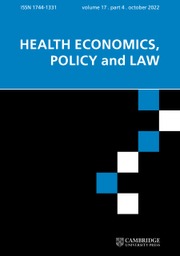Article contents
Funding pharmaceutical innovation through direct tax credits
Published online by Cambridge University Press: 24 August 2007
Abstract:
Rising pharmaceutical prices, increasing demand for more effective innovative drugs and growing public outrage have heightened criticism of the pharmaceutical industry. The public debate has focused on drug prices and access. As a consequence, the patent system is being reexamined as an efficient mechanism for encouraging pharmaceutical innovation and drug development. We propose an alternative to the existing patent system, instead rewarding the innovating firm with direct tax credits in exchange for marginal cost pricing. This concept is based on the fundamental assumption that innovation that benefits society at large may be financed publicly. As an industry which produces a social good characterized by high fixed costs, high information and regulatory costs, and relatively low marginal costs of production, pharmaceuticals are well-suited to such a mechanism. Under this proposal, drug prices fall, consumer surplus increases, access is enhanced, and the incentives to innovate are preserved.
- Type
- Articles
- Information
- Copyright
- Cambridge University Press
References
- 6
- Cited by


